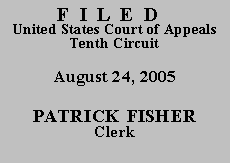

| CHARLES D. LEE,
v.
MIKE MULLIN |
|
Mr. Lee pleaded guilty in Oklahoma state court on May 15, 1990. The court accepted the plea and Mr. Lee was convicted. Mr. Lee did not seek to timely withdraw his guilty plea or seek a direct appeal to the Oklahoma Court of Criminal Appeals. Mr. Lee filed a petition for habeas corpus on March 19, 2003. The district court denied Mr. Lee's petition as time-barred under the one-year limitation provision of the Antiterrorism and Effective Death Penalty Act of 1996 ("AEDPA"). 28 U.S.C. § 2244(d).
AEDPA applies a one-year limitation period from the date of final conviction. Id. Because he did not choose to appeal, Mr. Lee's conviction became final on May 25, 1990, ten days after the entry of judgment and sentence. See Okla. Ct. Crim. App. R. 4.2(A). Because his conviction became final on or before April 24, 1996, to be timely, Mr. Lee's petition for writ of habeas corpus must have been filed by April 24, 1997. See United States v. Hurst, 322 F.3d 1256, 1261 (10th Cir. 2003).
AEDPA's time limitation is tolled while a properly-filed application for state post-conviction relief is pending. 28 U.S.C. § 2244(d)(2). Because Mr. Lee did not initiate post-conviction proceedings until June 27, 2002, long after expiration of the limitation period, there is no statutory tolling. See May v. Workman, 339 F.3d 1236, 1237 (10th Cir. 2003) (citing 28 U.S.C. § 2244(d)(2)).
AEDPA's one-year period of limitations is also subject to equitable tolling in extraordinary circumstances. Miller v. Marr, 141 F.3d 976, 978 (10th Cir. 1998). In this case, we find no "circumstances where the limitation period at least raises serious constitutional questions and possibly renders the habeas remedy inadequate and ineffective." Id. at 978. We find, as did the district court, that nothing alleged by Mr. Lee amounts to an extraordinary circumstance that warrants equitable tolling.
We DENY Mr. Lee's application for a COA, DENY his motion for IFP status as moot, and DISMISS the appeal.
Entered for the Court
Paul J. Kelly, Jr.
Circuit Judge